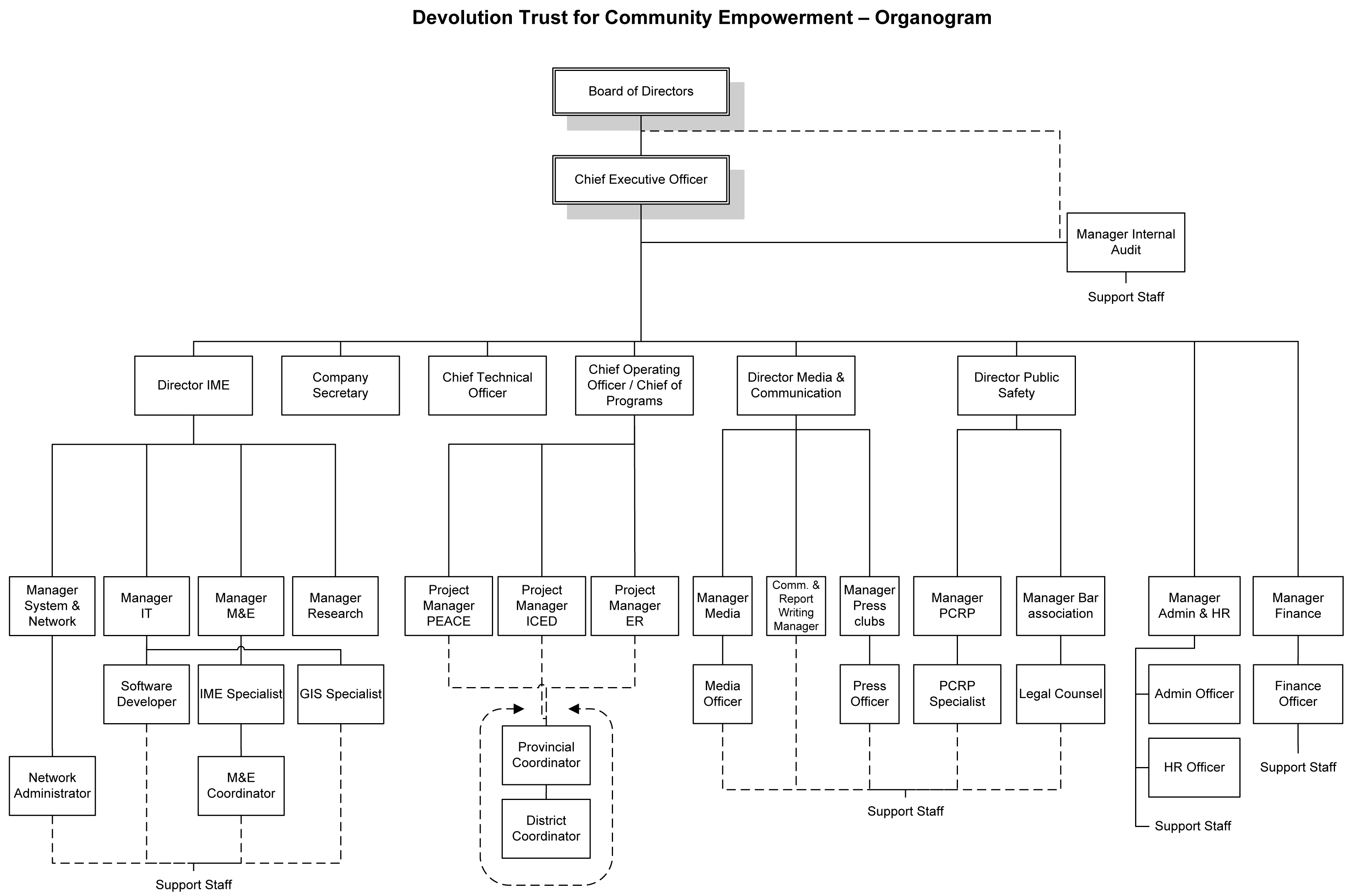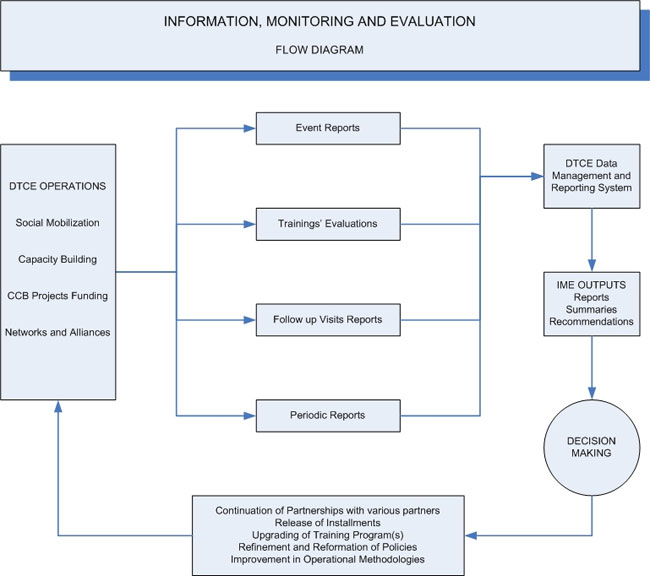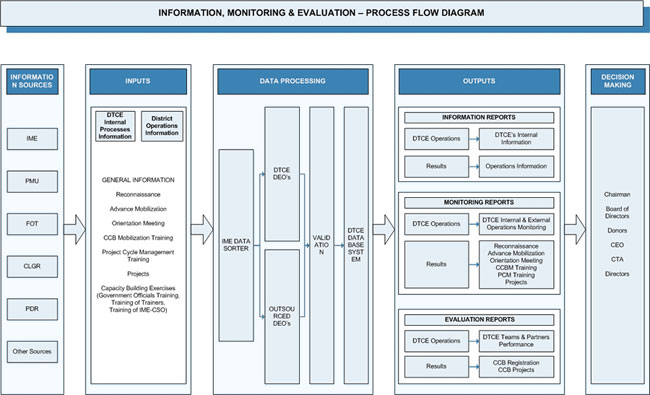- Email: contact@dtce.org.pk
- Phone: (+92) 111-333-823
Departments
Departments
Devolution Trust for Community Empowerment (DTCE) was
established in July 2003 as a not for profit Organization
registered with the Securities and Exchange Commission of
Pakistan (SECP) under section 42 of the Companies Ordinance
1984. DTCE has the following independent Board of Directors
for oversight and policy approval with a Chief Executive
Officer at the executive level. The current composition of
the BoD is as follows:

Chief Executive Officer (CEO)
The CEO is the team leader for the office of the Chief
Executive Officer and the DTCE management team. The CEO is
responsible for DTCE results, operations efficiency,
transparency and accountability before the board of
Directors. The office undertakes overall supervision of DTCE
operations. It evaluates DTCE performance on the basis of
DTCE IME systems and proposes policy adaptations across time
and policy differentiation in the territory.
Information, Monitoring and Evaluation (IM&E)
The main objective of the DTCE IME system is to collect
authentic data relevant to local governments and civil
society, to generate statistics and analyze data from the
operational information systems for aid to DTCE planning,
execution and evaluation for the promotion of community
empowerment at the local level. The DTCE Information,
Monitoring and Evaluation (IME) system provides relevant,
accurate, timely, and reliable information that is
continuously updated. It develops a two-way flow of
information from and to various actors and stakeholders. IME
also outsources the tasks of reporting filling, revision,
and collection to contracted Civil Society Organizations
(CSOs) at district level. This strategy also compliments
DTCE's vision of enhanced community participation,
empowerment, and citizen ownership. DTCE IME-CSOs collects
and analyzes data essential for the promotion of community
empowerment as well as evaluation of any mobilization
campaigns. The responsibilities of the IME-CSOs are Ground
Assessments, Documentation of the Orientation Meetings of
Union Officials and local organizations and Evaluation of
Capacity Building Events.
Information, Monitoring & Evaluation - Conceptual Flow of Activities
Devolution Trust for Community Empowerment (DTCE) was
established in July 2003 as a not for profit Organization
registered with the Securities and Exchange Commission of
Pakistan (SECP) under section 42 of the Companies Ordinance
1984. DTCE has the following independent Board of Directors
for oversight and policy approval with a Chief Executive
Officer at the executive level. The current composition of
the BoD is as follows:

Information, Monitoring & Evaluation - IME Formats used in various activities
Devolution Trust for Community Empowerment (DTCE) was
established in July 2003 as a not for profit Organization
registered with the Securities and Exchange Commission of
Pakistan (SECP) under section 42 of the Companies Ordinance
1984. DTCE has the following independent Board of Directors
for oversight and policy approval with a Chief Executive
Officer at the executive level. The current composition of
the BoD is as follows:

Internal Audit
DTCE Internal auditing is an independent, objective
assurance and consulting activity designed to add value and
improve DTCE’s operations. It helps DTCE management to
accomplish its objectives by bringing a systematic,
disciplined approach to evaluate and improve the
effectiveness of systems and processes through which the
functions of DTCE are initiated, run, recorded, evaluated
and reported. At DTCE Internal Audit Function comprises of
an Audit Committee/Management Committee comprising of two
members from DTCE Board of Directors and Internal Audit
department supervise by Manager Internal Audit. Professional
and trained staff is the core strength of DTCE Internal
Audit Department. DTCE Internal Audit supports compliance
within the best practices framework in two significant ways.
First, Internal Audit is integral component of the
monitoring system. Second, its fieldwork results in a wide
variety of information that is used to ensure and improve
the awareness of and adherence to compliance requirements.
DTCE Internal Audit provides assistance to other departments
through the conduct of audit related services including
reviews, cost-effectiveness analysis, and implementation
support. Internal Audit Department performs function
parallel to these other department, providing an insight of
the areas needing attention for improvement along with
suitable recommendations.
Finance Department
DTCE Finance Department is responsible for smooth operations
of the organization. Finance department is mainly
responsible for financial accounting, payroll, estimating
and handling cash in- and outflow thus managing liquidity.
Finance department is also involved in roles like management
accounting, strategy involvement, management information
systems and financial analysis. At DTCE Finance department
is working under the supervision of Manager Finance with
direct reporting to Chief Executive Officer. Professional
and experienced staff is working in finance department. DTCE
finance department is also responsible for documentation,
recording business transactions in financial accounting
software and the controlling of incoming and outgoing cash
flows as well as the actual handling of the cash flows. This
gives the financial department and the senior management
useful tools to see how the company is performing at any
given time. The finance department is also responsible for
the payment of bills, wages and salaries and procurement of
goods or services.
Field Operations
The FOTs are the jugular vein of DTCE, facilitating the
community empowerment project on ground in 6124 unions all
over Pakistan with support from the headquarter teams. The
teams are responsible for reaching out through strategic
interventions to the local government, unions and CCBs as
well as civil society organizations and activate their
participation in development initiatives at grass roots
level. The teams employ high level of motivation and
community mobilization ensued by systematic follow up
activities. The entire social mobilization process is
generating a knowledge based learning cycle allowing for
adaptation in policy and practice in the local government
devolution model.

